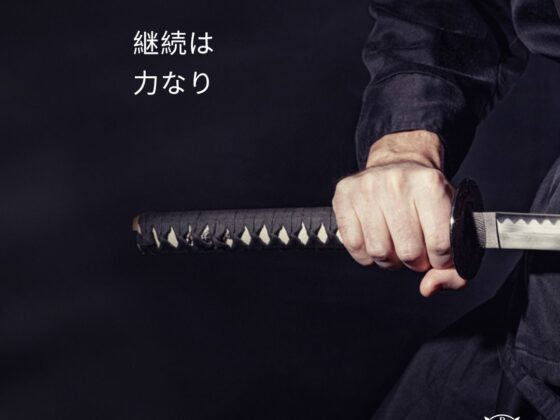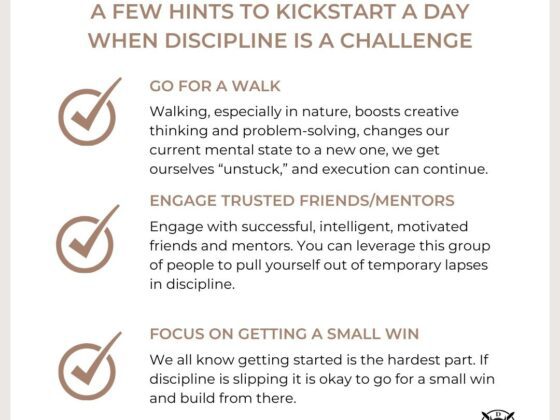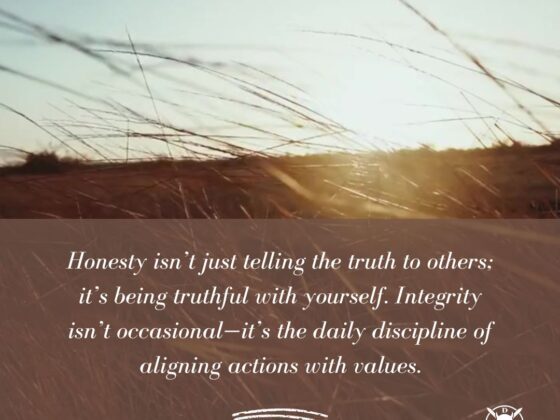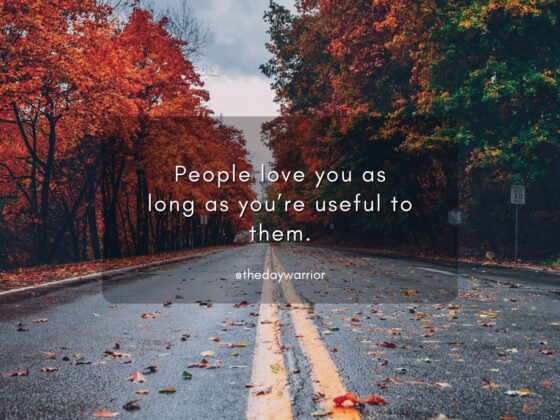“If you make a mistake from time to time… You’re human. If you make the same mistake repeatedly… You’re negligent.”
Andy Friscella
Failure is an influential teacher.
When faced with failure, reflect on your missteps to identify lessons and turn them into stepping stones.
While you must find the discipline required to thoroughly vet decisions before making them, I also strongly recommend that you do not postpone or avoid making decisions altogether to prevent mistakes from happening in the first place.
None of us are perfect, and the mistakes we make in life are where we learn and build the experience we need to be successful later in life.
Look at each failure or mistake as an opportunity to open new doors and learn things you have never considered. Life often gets in the way, but each day presents an opportunity to learn, grow, and enhance our lives, turning progress into an increasingly rewarding daily pursuit.
Life’s challenges can often feel like obstacles, but they also hold the potential for growth and self-improvement.
Each day is a new chance to learn something meaningful, take small steps forward, and enrich your journey. When you view progress as a daily pursuit, life becomes an evolving reward rather than a rigid destination.
Embrace each day’s opportunities, and let them guide you toward a brighter, more fulfilled version of yourself.
My Biggest Mistake
“Shit.”
That was my first thought when I left the immigration office that day. I had made a critical mistake, one that almost cost me everything I had worked for in Japan.
Years ago, while living in Japan, I had to renew my work visa periodically to remain in the country. I assumed there was a 30-day grace period after the expiration date. There wasn’t.
I approached the immigration counter with my paperwork, expecting a quick five-minute renewal. The officer looked at me and said, “You are one day late.” I smiled and replied, “Yes, I understand, but it’s within the approved thirty days.”
I expected a minor inconvenience. Instead, another immigration officer approached me and asked me to follow them. That’s when I realized—this wasn’t the normal process.
They led me through a maze of hallways and doors, far from the familiar waiting area. The further we walked, the more uneasy I felt. Eventually, we arrived at a different waiting room—one I had never seen before. The people around me looked… different. I had just gone from a room full of law-abiding citizens to one filled with individuals who didn’t give off the same vibe.
I was told to sit and wait.
A new immigration officer called me to the counter, handed me back my passport, and unceremoniously informed me that I was now in the deportation process. There was a vague mention that I could contest it, but the details were unclear—something about thirty to ninety days to appeal.
I left the immigration office in total shock, which quickly turned into panic. I had never been in trouble like this before.
The worst part? The delay in renewing my visa wasn’t due to laziness or negligence. I had just landed a once-in-a-lifetime job opportunity—the exact role I had been working toward for five years. I had spent years struggling through the challenges of middle management in Japan, debating whether to leave the country or double down and build a career. I finally found the perfect position, moved to a new apartment, and messed up my renewal schedule in the chaos of it all.
Now, just weeks after securing my dream job, I was facing deportation.
I could have spiraled into panic and self-pity—and for a few days, I did. But then, I made a choice. I refused to give up.
I focused on two things:
- I owned my mistake. Even though it was an honest oversight, my visa was critical to my future in Japan. I should have been more deliberate with my renewal plans and fully understood every detail of the deportation process.
- I committed to learning everything about the deportation process. Learning from our mistakes is critical to fixing them or preventing them from happening again.
My research uncovered something critical:
- There were no fixed rules for how my deportation interview would go.
- My mistake was more common than I thought, and there was a clear process to contest it.
- The process wasn’t dictated strictly by Japanese immigration law—it depended entirely on the discretion of the officials handling my case.
- It wouldn’t be just one interview—it would be a series of interviews conducted the same day. And the first few? They would always be a “no.”
Armed with this knowledge, I prepared like I would for a job interview. I wore a suit and tie. First impressions matter. I practiced potential questions and responses. I wasn’t going to fumble under pressure. I gathered every possible document in advance. Respect their time, leave no gaps in my case.
I barely slept the night before.
When I arrived at the immigration office, the interviews began.
Interview #1 – Conducted by a strict-looking immigration officer. The result: NO. They handed me a form saying something like, “Interview failed. Deportation procedures to continue.”
Interview #2 – Another officer, equally strict. The result: NO. Another form, same message.
Interview #3 – A slightly more friendly officer this time. The result: NO. More paperwork.
Interview #4 – Another no? I was not completely sure I returned to my seat, waiting for Interview #5.
At this point, I was sure it was over. My dream opportunity was ruined. My five years of effort in Japan—gone. I started to panic.
Would I be banned from ever returning?
Then, something unexpected happened.
They called me back to the counter, but instead of conducting a fifth interview, they handed me my passport.
Inside was a brand-new, three-year work visa.
No explanation. No fanfare. Just a quick thank you and a goodbye from the officer.
Crisis averted.
That one mistake almost cost me the next sixteen years in Japan—sixteen years that led to: A fantastic international career, two dogs, a loving wife, a beautiful new home, two wonderful kids, and priceless experiences I wouldn’t trade for anything.
All because I didn’t take my visa renewal seriously.
This experience reinforced a hard truth: When something is important, you don’t leave it to chance. You own it, prepare for it, and take responsibility for it.
If I had assumed my situation was hopeless, I would have lost everything.
Instead, I took action, fought for my future, and won.
Looking back, I’m grateful for the hard lessons, and my ability to learn from this experience.
What I learned from this mistake:
- Own the mistake.
- Do the research.
- Show up prepared.
- Never quit after the first “no.”
Why Learning from Mistakes is Important to Your Success
Mistakes are not just unfortunate mishaps; they are essential learning experiences that shape us into better versions of ourselves.
Here’s why embracing mistakes is crucial to success:
- Mistakes Build Experience – Every mistake provides insight that helps refine your approach. The most accomplished individuals have made numerous mistakes along their journey.
- They Strengthen Resilience – Mistakes challenge you to keep going despite setbacks, building mental toughness and perseverance.
- They Promote Continuous Improvement – By analyzing what went wrong, you can make smarter decisions in the future and improve step by step.
- They Encourage Innovation – Fear of mistakes stifles creativity. Accepting errors as part of the process allows you to take risks and innovate.
- They Foster Personal Growth – Learning from mistakes helps shape character, develop problem-solving skills, and reinforce accountability.
Each mistake is a stepping stone to becoming a little better every day.
When you make mistakes, you gain knowledge, making future challenges easier to overcome.
The key is to apply these lessons consistently and use them as motivation to push forward.
How to Reframe Mistakes as Opportunities to Learn
It is essential to reframe mistakes as opportunities to learn and improve. Mistakes that do not kill you are pathways to creating new experiences that are critical to the journey we call life.
We limit our ability to grow and develop resilience if we avoid making mistakes.
The key is not avoiding mistakes but using them as stepping stones toward personal and professional growth. Here are a few actionable steps to reframe mistakes as opportunities to learn:
- Acknowledge the Mistake Without Judgement: Be open to the concept that mistakes are okay. Accept that mistakes are a natural part of growth and avoid attaching negative emotions to them. View them as stepping stones rather than failures. Instead of being overly critical, shift your mindset to learning and adaptation. Acknowledge that setbacks are temporary and are valuable for developing new insights.
- Adopt a ‘No Fear of Mistakes’ Mindset: A critical part of reframing mistakes is removing the fear of making them. Understand that mistakes are not failures but opportunities to improve. Approach challenges with curiosity and confidence, knowing that even if things don’t go perfectly, the experience is valuable. Let go of the fear of making mistakes, which often limits growth and creativity. Fear keeps us stagnant, but an openness to learning fosters progress and innovation.
- Analyze What Went Wrong: The key to framing mistakes is not fearing them but learning from them. Reflect on what happened, and make sure you are allowing yourself to analyze the situation objectively. Ask yourself what led to the mistake and identify areas where things went off track. Journaling or discussing the situation with a mentor or trusted friend can bring clarity. By examining what went wrong, you can develop a better strategy for similar situations in the future.
- Focus on Growth, Experience and Action: Focus on what you can learn from the experience. What knowledge, skills, or strategies can you take away to improve future outcomes? Remember, you are reframing mistakes as opportunities to build expertise and understanding. The goal is to build your talent stack so that you can apply what you learn when you reencounter a similar situation. Use the newfound knowledge to tackle similar situations in the future, and don’t dwell on the mistake.
- Develop Resilience and Adaptability: Mistakes can be challenging, but they are also opportunities to develop resilience. The more you experience and learn from setbacks, the more mentally strong and adaptable you become. Resilience is a key trait of high achievers and is built through overcoming difficulties and pushing forward.
- Embrace a Growth-Orientated Mindset: When you view mistakes as part of the learning process, you shift from a fixed mindset to a growth mindset. A fixed mindset assumes that abilities and intelligence are static, whereas a growth mindset believes that skills and intelligence can be developed over time. Mistakes become part of your learning curve, not a definition of your potential.
- Apply Lessons to Future Decisions: A mistake is only a waste if you do not apply the lessons learned. Take actionable steps based on your insights to ensure you do not repeat the same errors. This could mean refining your approach, adjusting your mindset, or seeking additional training or knowledge. Each mistake should serve as a blueprint for improvement.
- Turn Mistakes into Motivation: Rather than letting mistakes discourage you, use them as fuel to become better. Many of the world’s most successful individuals have encountered repeated failures before achieving their goals. Instead of feeling defeated, channel that energy into motivation. Remember that setbacks are temporary, but the lessons they provide are lasting.
Final Thoughts
By taking these steps and reframing mistakes as learning experiences, you can build resilience, encourage continuous learning, and turn setbacks into powerful personal and professional growth opportunities. Life’s journey is filled with ups and downs, but by embracing the learning process, you set yourself up for a future of success and fulfillment. Every mistake you make is another lesson learned, another opportunity seized, and another step toward your best self.
The Day Warrior
How to find more content from The Day Warrior:
If you enjoyed this newsletter, please subscribe.
If you want to support The Day Warrior or purchase my book, Getting A Little Better Every Day, check out my new online shop: https://thedaywarrior.sellfy.store
If you want to provide feedback, please take The Day Warrior Survey.
If you want to have a deeper discussion about this subject, please get in touch with The Day Warrior.
Follow me on X for daily short and long-form content: @thedaywarrior.
My LinkedIn information is here: https://www.linkedin.com/in/the-day-warrior/
I am also on Instagram: @thedaywarrior.
My website is http:/thedaywarrior.com.
“Never blindly accept what you read online. Always challenge it with an open and critical mind.”
The Day Warrior










